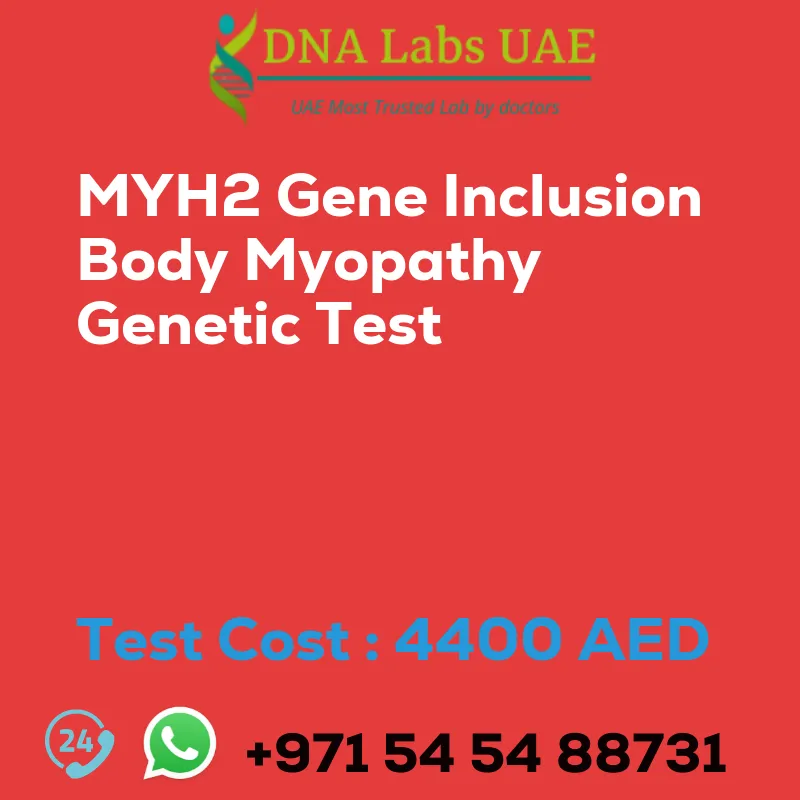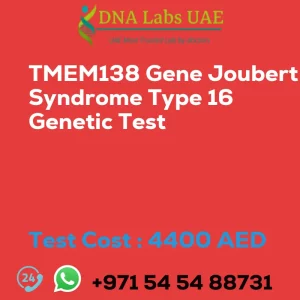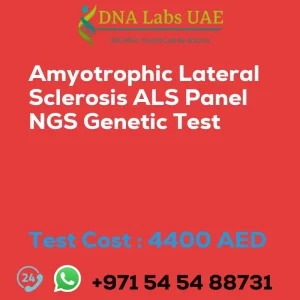MYH2 Gene Inclusion Body Myopathy Genetic Test
Test Name: MYH2 Gene Inclusion Body Myopathy Genetic Test
Components: MYH2 gene analysis
Price: 4400.0 AED
Sample Condition: Blood or Extracted DNA or One drop Blood on FTA Card
Report Delivery: 3 to 4 Weeks
Method: NGS Technology
Test Type: Neurological Disorders
Doctor: Neurologist
Test Department: Genetics
Pre Test Information: Clinical History of Patient who is going for MYH2 Gene Inclusion Body Myopathy NGS Genetic DNA Test. A Genetic Counselling session to draw a pedigree chart of family members affected with MYH2 Gene Inclusion Body Myopathy.
Test Details: The MYH2 gene is associated with inclusion body myopathy, a rare genetic disorder characterized by muscle weakness and wasting. Inclusion body myopathy can be caused by mutations in the MYH2 gene, which encodes for the myosin heavy chain 2 protein.
NGS (Next-Generation Sequencing) genetic testing is a type of genetic testing that uses advanced sequencing technologies to analyze multiple genes simultaneously. It can detect mutations or variations in the MYH2 gene and other genes associated with inclusion body myopathy. NGS testing is more efficient and cost-effective compared to traditional sequencing methods, as it can analyze multiple genes in a single test.
The MYH2 gene inclusion body myopathy NGS genetic test involves obtaining a DNA sample, typically through a blood or saliva sample, from the individual being tested. The DNA is then sequenced using NGS technology to identify any mutations or variations in the MYH2 gene. The results of the test can help in confirming a diagnosis of inclusion body myopathy and provide information about the specific genetic variant involved.
Genetic testing can be useful for individuals with symptoms suggestive of inclusion body myopathy, as well as for their family members who may be at risk of inheriting the condition. It can aid in diagnosis, inform treatment decisions, and provide valuable information for genetic counseling and family planning. However, it is important to note that genetic testing may not always provide a definitive diagnosis, and clinical evaluation by a healthcare professional is still necessary.
| Test Name | MYH2 Gene Inclusion body myopathy Genetic Test |
|---|---|
| Components | |
| Price | 4400.0 AED |
| Sample Condition | Blood or Extracted DNA or One drop Blood on FTA Card o |
| Report Delivery | 3 to 4 Weeks |
| Method | NGS Technology |
| Test type | Neurological Disorders |
| Doctor | Neurologist |
| Test Department: | Genetics |
| Pre Test Information | Clinical History of Patient who is going for MYH2 Gene Inclusion body myopathy NGS Genetic DNA Test A Genetic Counselling session to draw a pedigree chart of family members affected with MYH2 Gene Inclusion body myopathy |
| Test Details |
The MYH2 gene is associated with inclusion body myopathy, a rare genetic disorder characterized by muscle weakness and wasting. Inclusion body myopathy can be caused by mutations in the MYH2 gene, which encodes for the myosin heavy chain 2 protein. NGS (Next-Generation Sequencing) genetic testing is a type of genetic testing that uses advanced sequencing technologies to analyze multiple genes simultaneously. It can detect mutations or variations in the MYH2 gene and other genes associated with inclusion body myopathy. NGS testing is more efficient and cost-effective compared to traditional sequencing methods, as it can analyze multiple genes in a single test. The MYH2 gene inclusion body myopathy NGS genetic test involves obtaining a DNA sample, typically through a blood or saliva sample, from the individual being tested. The DNA is then sequenced using NGS technology to identify any mutations or variations in the MYH2 gene. The results of the test can help in confirming a diagnosis of inclusion body myopathy and provide information about the specific genetic variant involved. Genetic testing can be useful for individuals with symptoms suggestive of inclusion body myopathy, as well as for their family members who may be at risk of inheriting the condition. It can aid in diagnosis, inform treatment decisions, and provide valuable information for genetic counseling and family planning. However, it is important to note that genetic testing may not always provide a definitive diagnosis, and clinical evaluation by a healthcare professional is still necessary. |







